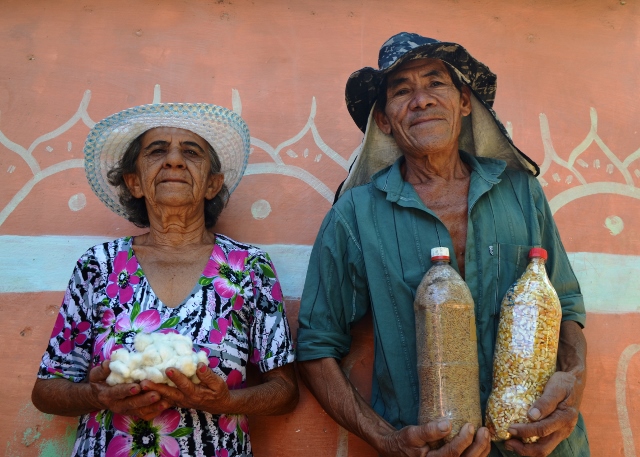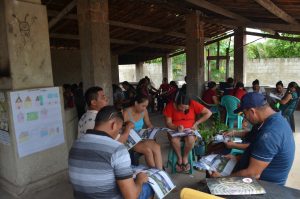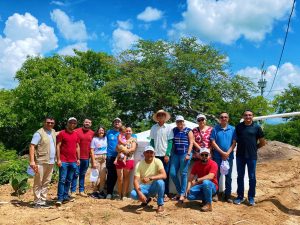Guardians of Biodiversity – The experience of Maria da Silva soares (Mariinha) and Sebastião Rodrigues Soares
Guardians of Biodiversity – The experience of Maria da Silva soares (Mariinha) and Sebastião Rodrigues Soares
Farmer Maria da Silva Soares, better known as Mariinha, is what we might call an agroforestry alchemist. She has an unconditional love for plants, she learned from her father how to keep seeds and from her grandmother the medicinal properties of the elements of nature – knowledge that she stores in her medicinal bottles. “In the woods I forget time. All my life I loved plants”, says Mariinha. She married Sebastião Rodrigues Soares in 1966 and the two chose Escalvado Settlement, in the Itapipoca Mountains, to live.
Sebastião also cultivates a deep love for nature, and from their union could only be born a life of experimenting farmers and guardians of biodiversity. They are known in the region for having a wide variety of stored native seeds. Among dozens of bottles they preserve more than 20 varieties of creole seeds in rice, corn, bean, beans, cotton, janaguba and catingueira.
The ‘Florestação Project’ came to add knowledge to the already sensitive practice of Mariinha and Sebastião. Knowledge and practices about agroforestry, enriched furthermore the family’s productive area. “It is a yard that has its own children”, as Sebastião tells us about the green areas that were multiplying around the house. “Each person should have a yard like this. But you must have persistence. When things are given to us… you can never get it, put it in your mouth and swallow it right away. You have to give it some good lot of labor”, continues the farmer about working on the land. “It is necessary to multiply things”, adds Mariinha.


Multiplying is a central word in agroecology. And Mariinha and Sebastião became true multipliers of agroecological knowledge and practices. In the family yard there is a multitude of species, such as leucena, mutamba, aroeira, blackberry, gonçalo alves, pau d’arco, ata, seriguela, papaya, annatto, sorghum, orange, tangerine, bean, corn, beans, macaxeira, jerimum, banana, gliricidia, thrush, rice, janaguba, catingueira, cedar, angico, black jurema, jenipapo, torem, pajeú and guava. Regarding the seeds, Mariinha always seeks to gather them in order, selecting carefully and then storing them. A task she learned from her father, who kept seeds in glass bottles, kerosene cans, or gourds — making the lids himself and sealing them with beeswax. The diversity of agroforestry is reflected in the family food habits. “A lot of things I don’t buy anymore, I get them out of the yard, they’re better like that! If I want paprika I have my feet of annatto, if I want a juice I have guava, seriguela”, explains Mariinha.
Solidarity is also widely practiced in this community. There are many exchanges, where farmers can observe and debate on agroecological experimentation.Whenever they go for some exchange, they come back with a new seedling or seeds back in their luggage, to further enrich the diversity of their yard. Thanks to this solidarity, many species have been rescued from extinction, as the case of a rare sort of corn that the family had lost due to a scarce winter, managing to recover it through another farmer who shared the treasure, so that it now could grow and multiply again. In this way, Sebastião and Mariinha have been working with their family: growing, multiplying and strengthening agroecological knowledge and practices, in a life dedicated to sowing and preserving the rich biodiversity of the Semiarid.


